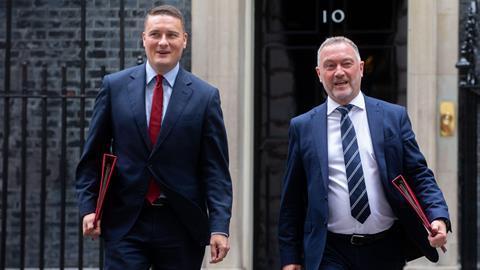The plan is out, but clarity isn’t. What will the mandatory reporting and targets look like? And what about the new ‘healthy food standard’?
The government published its 10-year plan for the NHS last Thursday, hailing it as a “moonshot to end the obesity epidemic”. But the 160-page document left many important questions unanswered for a food and drink industry staring down the barrel of mandatory healthier sales targets. So, here’s the skinny on the key questions.
What will mandatory reporting look like?
In what the government claims is a “world first”, ministers promise mandatory healthy food sales reporting will be introduced for all large companies in the food sector by the end of the Parliament.
The writing has been on the wall for this for a number of weeks, with supermarkets, led by Tesco and even the FDF, which had strongly opposed mandatory reporting previously, swinging behind the idea. The reporting will then be used to set mandatory targets for improvement.
Ministers say it will provide the “robust baseline for all future evidence-led policies”. It’s understood Defra and the Food Strategy Advisory Board (FSAB) will unveil more detail on the timeframe, metrics and expectation of companies within the next couple of weeks.
“The plans specifically refer to all large food businesses as we know DHCS wants it to cover retailers, manufacturers and OOH businesses,” says one supermarket source. “However, we don’t know what large actually means as we also know DH wants to exclude SMEs.”
The government could exclude any company with fewer than 250 employees, to fit with its incoming advertising restrictions.
Many assume the government will put on a mandatory footing the voluntary targets drawn up under the Food Data Transparency Partnership, which was nearing the point of launch last year before the general election got in the way.

The Grocer revealed in February 2024 that plans including reporting on the percentage of sales made up of HFSS foods, fruit & veg, and protein types (animal and plant) were ready to go, backed by supermarkets including Tesco, Sainsbury’s and Morrisons, and suppliers such as Nestlé, Mars and General Mills.
“We made great progress with the FDTP, which will take us a huge step closer to agreeing appropriate metrics,” says a health campaigner source. “But now the stakes are higher, we will want to be certain that we have the metrics in place that will meaningfully capture the status of the food system.”
The plan makes no mention of reporting on areas such as the proportion of plant-based food. Last week more than 200 NGOs called on ministers to ensure that as well as HFSS, mandatory reporting included the split between plant and animal protein, fruit & veg sales and climate emissions. This would be more transparent, but also potentially lengthen the time it takes to roll out.
“We don’t know if the reporting would be a straightforward percentage split of HFSS and non-HFSS similar to what some businesses do voluntarily, or a more detailed approach by food category,” says the supermarket source.
“All of this will require legislation, so we presume there will be a consultation prior to that. But so far there are no details on timings other than an intimation it will be implemented this Parliament, ie before 2029.”
When will new ‘healthy food standard’ be ready?
While the government turning to mandatory health reporting was no surprise, mandatory targets were.
However, campaigners have long argued that without targets reporting is pointless. With influential groups like nudge body Nesta having proposed enormous fines for supermarkets that fail to hit them, it is the introduction of targets that give the proposals teeth.
They will also, cynics suggest, mean Labour will need every minute of the 10 years to get its proposals over the line.
“The talk of the targets is really pivotal,” says a heath campaign source. “If we are looking to shift shoppers towards healthier products, the industry needs a level playing field to ensure they are all working towards the same end goal - healthier outcomes for their customers, wherever they shop.
“The timeframes are to be decided, but given the shocking projections of diet-related ill health in this country, we urge them to move as fast as possible.”
Wes Streeting has spoken about bringing in a new “healthy food standard”, which suggests ministers are looking not just at the proportion of food that is non-HFSS but also how labelling could be used to communicate what food is healthy.
But as the move to traffic light labelling showed, that could take years, even ignoring the elephant in the room – what to do about ultra-processed foods.
The government has also indicated it will revise the “out of date” 2004 nutrient profiling model (NPM) as the basis for categorising which foods are more or less healthy.
The now defunct Public Health England started a review of the NPM in 2018 – it was subject to such fierce opposition from the food industry that it has never again seen the light of day, until now.

Companies warned products such as cereals, fruit juice and yoghurts faced being “demonised” and banned from in-store and TV promotions. And with the debate on UPF having intensified, a further review will be regarded with great trepidation by many companies – though it will be welcomed by others.
Advertising bosses have also warned that, with the NPM used to decide which products fall foul of the already delayed TV and online junk food advertising ban, a dramatic expansion of its reach could cause further confrontation for the strategy.
With Labour expected to prioritise equal access to health food, the work on standards may also include targeted measures to help deprived areas, alongside it’s expected tightening of planning laws for new OOH outlets.
“I’m not sure what the ‘standard’ is exactly, but the suggestion is food businesses would make plans to increase their healthy options over time,” says the supermarket source.
“However, I think we are a long way from that and would be very surprised if that was delivered this Parliament.”
Others insist targets could come in alongside reporting.
“We would like to see mandatory reporting for all large food businesses and targets for supermarkets in place within this Parliament,” says Lauren Bowes Byatt, deputy director of healthy life at Nesta.
“That is possible, but will require swift work from the government, engagement with industry and the wider NGO sector.
“Our recommendation is that targets should apply to large retailers and should not be delayed while consideration is given to whether it could apply to other sectors.
“A targets-based policy could be extended to the out-of-home sector such as takeaways, fast food and restaurants - but we recognise this has additional challenges that will need to be worked through.”
Will the FSA become the government’s new enforcer?
In its proposals for targets, Nesta called on the creator of that 2004 model, the Food Standards Agency, to be put in charge of enforcing new targets.
With FSA boss Professor Susan Jebb, who sits alongside the likes of Nesta on the FSAB, having openly angled for the agency to get the expanded brief, some believe that could be a way for Labour to ensure its targets have credibility and it’s not seen as being a lapdog to the supermarkets and big food manufacturers.
“As outlined in our proposal for mandatory targets for retailers, we believe that the FSA could provide a role and would be a sensible choice for the regulator of this policy,” says Bowes Byatt. “They have statutory powers to act as a regulator and already do so in other areas relating to food.
“There will need to be collaboration and work across the FSA, DHSC and Defra to deliver this policy effectively, and each has a key role to play on policy design, implementation and regulating.”
While the FSA has struggled with lack of resources on the ground to handle its existing remit, the emphasis on big data could also fit with its controversial trials of using ‘supermarket and food manufacturer’ data to help police its food safety remit, with an extension of that philosophy to public health and the obesity crisis.

While Labour has clearly demonstrated through its new plans and the initial work of the Food Strategy that it is prepared to work with industry, rather than just steamroller it, to borrow Streeting’s phrase, it will also be in for an onslaught from health groups if it is seen to be going down the same road as the previous government by bowing to its lobbying.
“While it is appropriate that the more responsible food businesses should feed their technical expertise and customer data into the process, we don’t think it is appropriate that any of the more regressive parts of the food industry, or those that have actively lobbied against implementation of current policies, should be at the table,” says the campaign source.
“The government, alongside health experts, should set the metrics, and have full transparency with the public over the process they used to reach them, and allow the food businesses to reach them with all the tools at their disposal.”
Will the government scrap the junk food promotions ban?
One of the biggest shocks in the plan was the announcement that the government plans to scrap the HFSS promotions ban.
That would mean ditching the ban on promotions in prominent locations brought in in 2023 and also the clampdown on multibuys such as bogofs, even though the latter doesn’t’ even come into force until October this year.
Ministers claim the move will help usher in an era of “smarter regulation” and instead of relying on clumsy Westminster interventions that have proved hard to enforce anyway, will give companies the freedom to work out how they achieve the new health targets through reformulation, incentives or layout changes.
But campaign groups warn of removing the main existing legal framework to protect shoppers from a flood of HFSS products is a step too far, even with targets.
Katherine Jenner, director of the Obesity Health Alliance said the promotions ban has created a level playing field which the food industry had consistently failed to provide by other actions and urged ministers to think again by keeping a “belt and braces approach.”
Meanwhile Katrina Anderson, principal associate at Mills & Reeve LLP, warns the move will make it “almost impossible” for companies to plan for compliance with the bogof ban due to come into force in less than three months.
“Retailers and brands that sell direct-to-consumer (DTC) online will have been preparing for compliance for many months, making significant changes to both physical stores and e-commerce platforms to comply with locations rules.
“To now hear that the government plans, at some unspecified point in the future, to repeal the current rules and replace them with an unknown new set of ‘smarter’ restrictions on the sale of (presumably) HFSS products makes planning for compliance almost impossible.”




















No comments yet